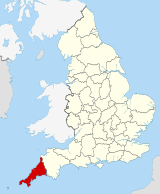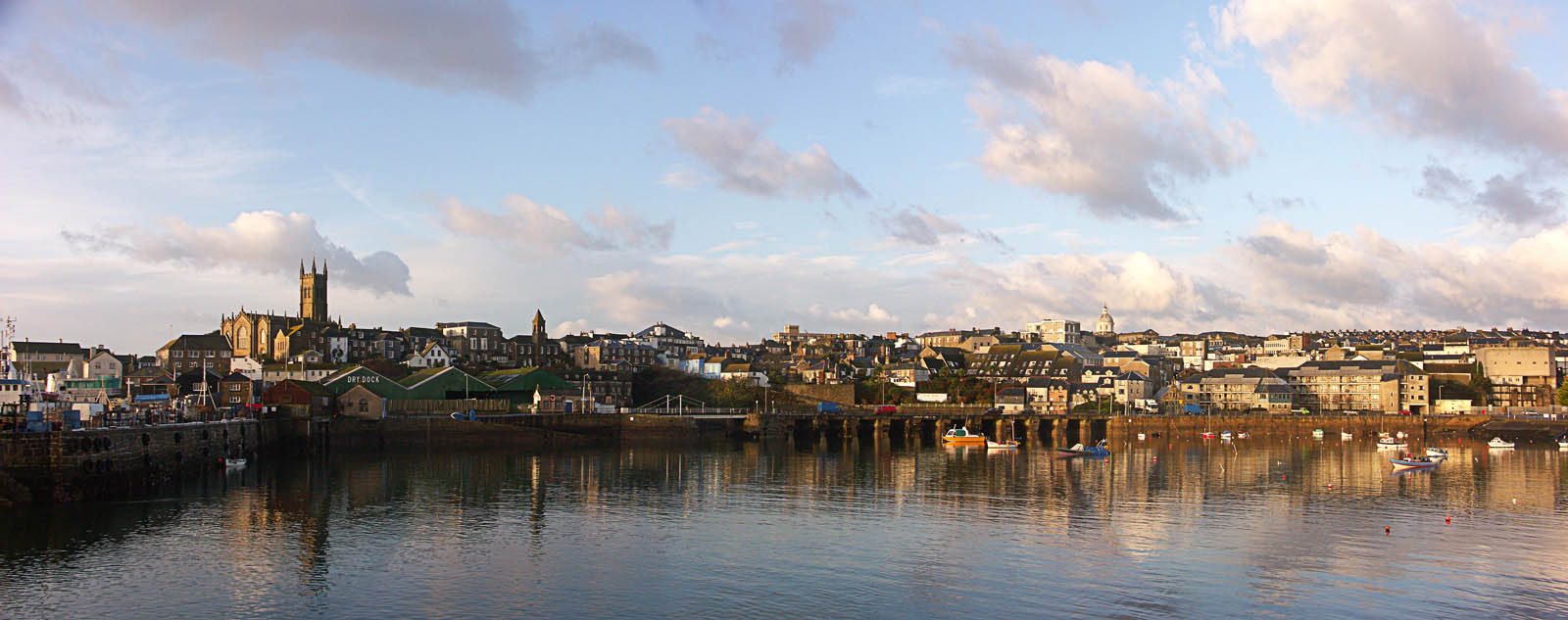Portal:Cornwall
  Cornwall (/ˈkɔːrnwɔːl, -wəl/; Cornish: Kernow; Cornish pronunciation: [ˈkɛrnɔʊ]; or [ˈkɛrnɔ]) is a ceremonial county in South West England. It is recognised by Cornish and Celtic political groups as one of the Celtic nations, and is the homeland of the Cornish people. The county is bordered by the Atlantic Ocean to the north and west, Devon to the east, and the English Channel to the south. The largest settlement is Falmouth, and the county town is the city of Truro. The county is rural, with an area of 1,375 square miles (3,562 km2) and population of 568,210. After Falmouth (23,061), the largest settlements are Penzance, Newquay, St Austell, and Truro. For local government purposes most of Cornwall is a unitary authority area, with the Isles of Scilly having a unique local authority. The Cornish nationalist movement disputes the constitutional status of Cornwall and seeks greater autonomy within the United Kingdom. Cornwall is the westernmost part of the South West Peninsula. Its coastline is characterised by steep cliffs and, to the south, several rias, including those at the mouths of the rivers Fal and Fowey. It includes the southernmost point on Great Britain, Lizard Point, and forms a large part of the Cornwall National Landscape. The national landscape also includes Bodmin Moor, an upland outcrop of the Cornubian batholith granite formation. The county contains many short rivers; the longest is the Tamar, which forms the border with Devon. (Full article...) Selected article Cornish (Standard Written Form: Kernewek or Kernowek; [kəɾˈnuːək]) is a Southwestern Brittonic language of the Celtic language family. Along with Welsh and Breton, Cornish is descended from the Common Brittonic language spoken throughout much of Great Britain before the English language came to dominate. For centuries, until it was pushed westwards by English, it was the main language of Cornwall, maintaining close links with its sister language Breton, with which it was mutually intelligible, perhaps even as long as Cornish continued to be spoken as a vernacular. Cornish continued to function as a common community language in parts of Cornwall until the mid 18th century, and there is some evidence for traditional speakers of the language persisting into the 19th century. Cornish became extinct as a living community language in Cornwall by the end of the 18th century, although knowledge of Cornish, including speaking ability to a certain extent, persisted within some families and individuals. A revival started in the early 20th century, and in 2010 UNESCO reclassified the language as critically endangered, stating that its former classification of the language as extinct was no longer accurate. The language has a growing number of second-language speakers, and a very small number of families now raise children to speak revived Cornish as a first language. Cornish is currently recognised under the European Charter for Regional or Minority Languages, and the language is often described as an important part of Cornish identity, culture and heritage. Since the revival of the language, some Cornish textbooks and works of literature have been published, and an increasing number of people are studying the language. Recent developments include Cornish music, independent films, and children's books. A small number of people in Cornwall have been brought up to be bilingual native speakers, and the language is taught in schools and appears on street nameplates. The first Cornish-language day care opened in 2010. (Full article...)Selected biographyVice-Admiral William Bligh FRS (9 September 1754 – 7 December 1817) was a British officer in the Royal Navy and a colonial administrator. He is best known for the mutiny on HMS Bounty, which occurred in 1789 when the ship was under his command. The reasons behind the mutiny continue to be debated. After being set adrift in Bounty's launch by the mutineers, Bligh and those loyal to him stopped for supplies on Tofua, losing a man to natives. Bligh and his men reached Timor alive, after a journey of 3,618 nautical miles (6,700 km; 4,160 mi). On 13 August 1806, Bligh was appointed Governor of New South Wales in Australia, with orders to clean up the corrupt rum trade of the New South Wales Corps. His actions directed against the trade resulted in the so-called Rum Rebellion, during which Bligh was placed under arrest on 26 January 1808 by the New South Wales Corps and deposed from his command, an act which the British Foreign Office later declared to be illegal. He died in London on 7 December 1817. (Full article...)
Did you know?
Selected quoteSelected picture
General imagesThe following are images from various Cornwall-related articles on Wikipedia.
WikiProjects
Related portalsTopicsHistory
Geography
Politics
Economy and demographics
Culture
SubcategoriesRecognised content
Featured articlesMain page featured articlesFeatured listsGood articles
Former good articlesIn the News articlesThings you can do'
Associated WikimediaThe following Wikimedia Foundation sister projects provide more on this subject:
Wikipedia in CornishDiscover Wikipedia using portals
| |||||||||||||||||||||||||||||||



































































